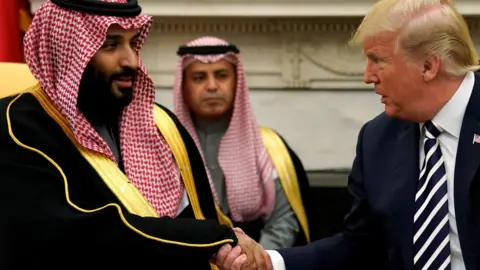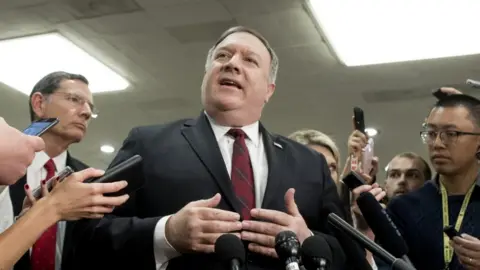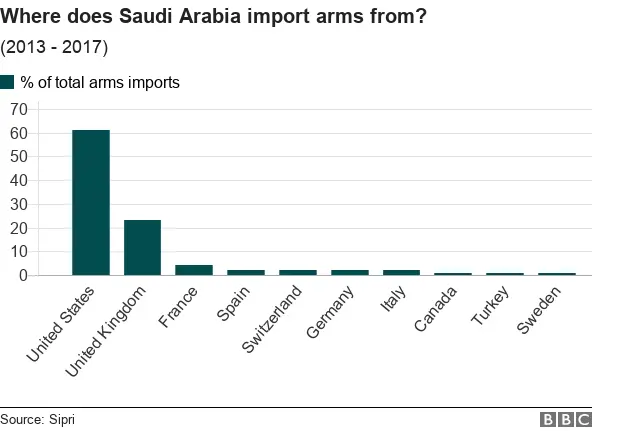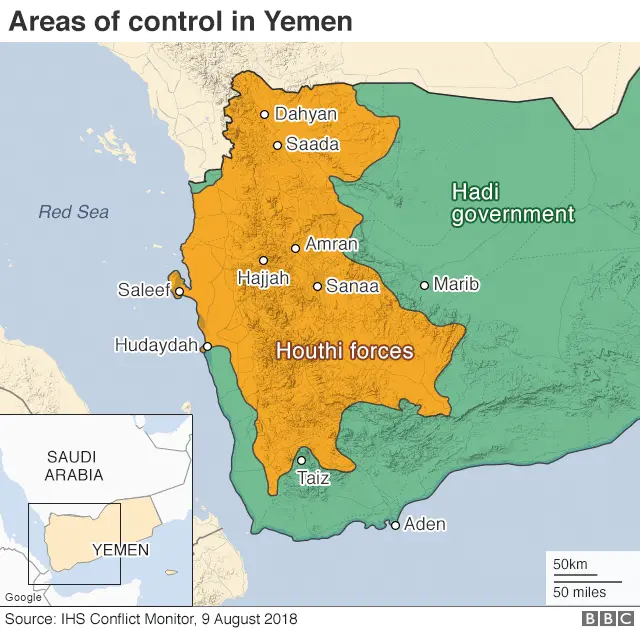Yemen war: Vote in US Senate delivers rebuke to Trump
 AFP
AFPThe US Senate has advanced a measure to withdraw American support for a Saudi-led coalition fighting in Yemen, in a blow to President Donald Trump.
Many senators are unhappy with Mr Trump's response to the murder of Saudi journalist Jamal Khashoggi.
Secretary of State Mike Pompeo and Defence Secretary Jim Mattis had urged senators not to back the motion, saying it would worsen the situation in Yemen.
However, senators voted 63-37 to take forward the bipartisan motion.
Why are senators unhappy with Trump?
Criticism of Saudi Arabia has grown since Khashoggi, a US resident, was killed while visiting the Saudi consulate in Istanbul in Turkey on 2 October.
US media have said the CIA believes Saudi Crown Prince Mohammed bin Salman ordered his killing.
 Reuters
ReutersHowever, President Trump has dismissed the report, saying the CIA had not drawn firm conclusions.
He has described Saudi Arabia as a vital ally and resisted calls for sanctions against the kingdom's leadership.
Senators are also unhappy that CIA director Gina Haspel did not attend their closed session hearing on relations with Saudi Arabia on Wednesday.
Ms Haspel has heard what Turkey claims is a recording of Khashoggi's murder and has studied evidence in the case. One senator described her absence as a "cover-up".
"It's time to send Saudi Arabia a message, both on its violation of human rights and the incredible humanitarian catastrophe it's creating in Yemen," Democratic Senator Bob Menendez said.
Republican Senator Bob Corker, who chairs the Senate Foreign Relations Committee, said: "We have a problem here. We understand that Saudi Arabia is an ally, of sorts, and a semi-important country. We also have a crown prince that's out of control."
A similar resolution came up for a Senate vote earlier in the year and failed to pass, the BBC's Barbara Plett Usher reports from Washington.
But the climate is different now, and senators are more and more concerned about the way Saudi Arabia is conducting the war, citing its terrible toll on civilians, our correspondent adds.
What does the vote mean?
The vote in the Senate means further debate on US support for Saudi Arabia is expected next week.
Some of the senators who voted for the motion do support coalition efforts in Yemen, but wanted to show their deep disapproval with how the Trump administration had handled Khashoggi's death.
 EPA
EPAEven if the Senate ultimately passes the resolution, it is unlikely to be approved in the current House of Representatives. Republicans hold a majority and have voted down similar measures in the past.
However, this could change in the new year, when Democrats take over the majority.
There could also be an impact on other votes - for example, Republican Senator Lindsey Graham has said he will withhold his vote on any key issue, including spending bills, until the CIA gives senators a briefing on the Khashoggi killing.
What's the US government position?
Mike Pompeo has restated the White House's view that "there is no direct reporting connecting the Saudi crown prince to the order to murder Jamal Khashoggi".
The Saudis have blamed rogue intelligence officers for the killing.
 Getty Images
Getty ImagesMr Pompeo also defended the administration's continued support for Saudi Arabia in Yemen, saying withdrawing it would undermine efforts to reach a ceasefire.
He said the US was "on a cusp" of gathering the warring parties for talks "to hopefully achieve a ceasefire".
A vote, he added, would "encourage the Houthis" and their Iranian allies.
The conflict between the Saudi-led military coalition and Houthi rebels has killed thousands of people and pushed millions more Yemenis to the brink of starvation.
How does the US support the coalition?
The US provides logistical and intelligence support to the coalition and sells weapons used by the Saudis.
The support includes helping coalition planes refuel mid-air, and offering military advice - for example, on how to target air strikes precisely.
More generally, the US provides more than 60% of Saudi Arabia's arms imports.

What is the situation in Yemen?
The conflict began in 2014 when the Houthi Shia rebels seized control of the north of the country and went on to take the capital Sanaa, forcing the president to flee.
It escalated dramatically in March 2015, when Saudi Arabia and eight other mostly Sunni Muslim Arab states - backed by the US, UK and France - began air strikes against the Houthis, with the aim of restoring the government.
In recent weeks, Houthi leaders have said they are ready to move towards a ceasefire if "the Saudi-led coalition wants peace".
The UK says that UN-led peace talks are set to take place next week in Sweden.

